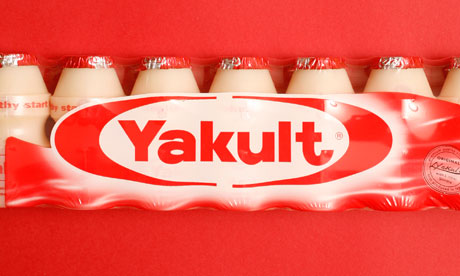
The food industry's probiotics sector, worth £200m a year in the UK, was called in to question today by a new European ruling that its health claims are unsupported by sound science.
The European Food Safety Authority (EFSA) posted its formal assessment of the merit of more than 800 health claims, including widely used assertions that probiotic products boost the immune system. The claims were submitted to the EFSA by the food industry and member states
Many of those on which the probiotic industry has based its advertising and marketing in recent years were ruled unproven by the EFSA's panel of independent scientists.
The panel concluded that the evidence the industry had submitted to support its claims that various food additives could strengthen the body's defences, improve immune function and reduce gut problems were either so general as to be inadmissable, or could not be shown to have the claimed effect.
In a separate ruling, the panel examined a dossier of 12 studies submitted by Yakult for its proprietary strain of probitoic bacteria, Lactobacillus casei shirota. It found that all were inadequate to support the company's claim that its products maintained immune defences against the common cold.
Nearly 60% of UK households regularly buy probiotic drinks, but the market became established without any independent assessment of its claims and has drawn criticism from consumer groups.
The gradual introduction of new EU regulations was finally agreed in 2007 as a result of pressure from consumer groups. They wanted food companies to be prevented from using health claims to sell products unless they had proved them first, and unless the products were deemed healthy enough overall to warrant claims of benefits. Under the new rules, member states were asked to submit health claims from manufacturers, along with dossiers of scientific evidence, for independent assessment by the EFSA.
Britain's Food Standards Agency collected more than 4,000 claims from the UK industry; across Europe, some 44,000 claims were submitted. EFSA scientists, who were taken by surprise by the volume of claims, whittled these down to 4,000 for detailed assessment.
The opinions published today were the lastest in a series of rulings. The EFSA had already published five opinions on claims relating to probiotics, all negative, although a spokeswoman said EFSA scientists "avoid using the term probiotics", since it has no proper scientific meaning.
Danone, the market leader in probiotic products, withdrew its claims that Actimel and Activia boosted the immune system and aided digestive health from the EFSA process after the scientists' earlier negative rulings on other manufacturers' products. It has since dropped most of the "immune health" claims from its advertising, and it currently has just one technical claim awaiting EFSA assessment: that "fermented milk that contains the probiotic Lactobacillus casei reduces the presence of Clostridium difficile toxins in the gut associated with the incidence of acute diarrhoea".
Today's EFSA rulings represent a serious blow to the food industry, which has invested heavily in new, so-called functional foods such as probiotics. These typcially sell for high margins, and enable manufacturers to differentiate their products from those of competitors in a crowded market. The EFSA did give some health claims favourable rulings, but they relate to vitamins and minerals for which the effects have long been known, such as the ability of iron to relieve anaemia.
The industry has complained that the EFSA is applying excessively rigorous scientific standards when assessing the new claims. It has asked for a series of meetings to discuss the criteria.
Yakult issued a statement saying its rejected claim was just one aspect of its research. "The claim was supported by well-designed, double-blind, placebo-controlled human studies," it said. "In response to the EFSA opinion, the company wishes to discuss the evaulation process and this outcome with EFSA. With the benefit of further guidance, the company anticipates a positive EFSA opinion in due course."

